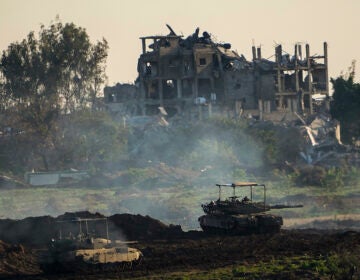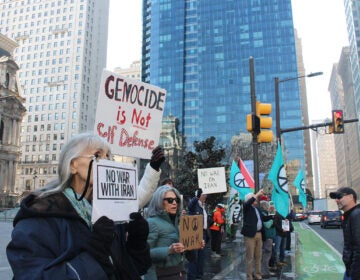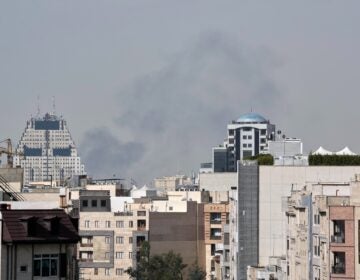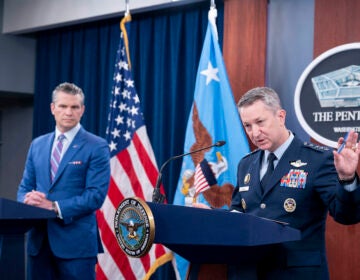Hamas leader visits Cairo as talks over another Gaza cease-fire gather pace
Ismail Haniyeh’s visit Wednesday is part of a flurry of diplomacy aimed at securing another cease-fire and swap of hostages for Palestinian prisoners.
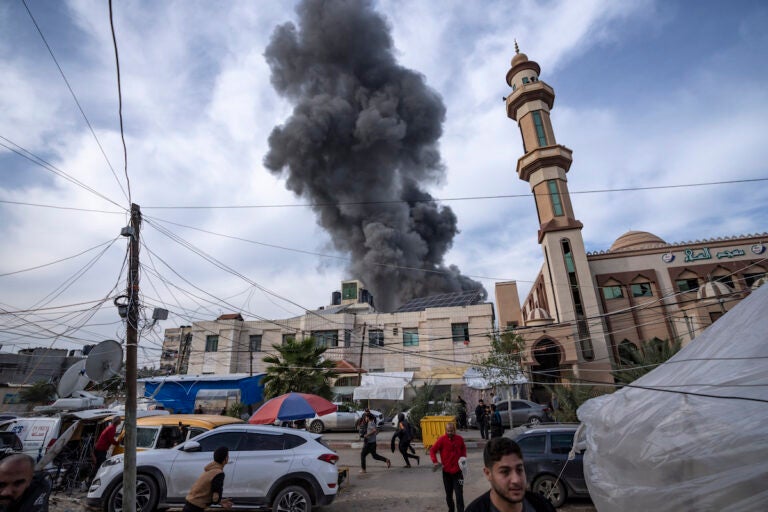
Smoke rises following an Israeli bombardment on Rafah, southern Gaza Strip, Wednesday, Dec. 20, 2023. (AP Photo/Fatima Shbair)
Hamas’ top leader traveled to Cairo on Wednesday for talks on the war in Gaza, part of a flurry of diplomacy aimed at securing another cease-fire and swap of hostages for Palestinian prisoners at a moment when Israel’s offensive shows no signs of slowing.
Hamas militants have been putting up stiff resistance, even as the Israeli army claims to be making great progress in eradicating them. The visit to Cairo by its top leader, Ismail Haniyeh, came a day after Hamas fired rockets that set off air raid sirens in central Israel. It was a show of strength after a 10-week war that has devastated much of northern Gaza, killed nearly 20,000 Palestinians, and driven some 1.9 million — nearly 85% of the population — from their homes.
Israel has called on the rest of the world to blacklist Hamas as a terrorist organization, saying it must be removed from power in Gaza in the wake of its Oct. 7 rampage across southern Israel that triggered the war.
But the sides have recently relaunched indirect talks, mediated by Egypt, Qatar and the United States. The goal is to achieve another cease-fire, and to free more hostages Hamas took in its attack in exchange for Palestinians imprisoned by Israel.
“These are very serious discussions and negotiations, and we hope that they lead somewhere,” the White House’s national security spokesman, John Kirby, said Wednesday aboard Air Force One while traveling with President Joe Biden to Wisconsin.
Mobile phone and internet service was down across Gaza again on Wednesday, an outage that could complicate efforts to communicate with Hamas leaders inside the territory who went into hiding after Oct. 7.
The war has led to a humanitarian crisis in Gaza. Tens of thousands of people are crammed into overcrowded shelters and tent camps amid shortages of food, medicine and other basic supplies. Israel’s foreign minister traveled to Cyprus to discuss the possibility of establishing a maritime corridor that would allow the delivery of large amounts of humanitarian aid to Gaza.
Wide gap remains in talks on hostages
Despite a burst of diplomacy by high-level officials in recent days, the two sides appeared to be far from an agreement.
Hamas has said no more hostages will be released until the war ends, and is expected to insist on the release of large numbers of Palestinian prisoners, including high-level militants, for the captives that remain.
Israel has rejected the demands so far. But it has a history of lopsided exchanges for captive Israelis, and the government is under heavy public pressure to bring the hostages home safely.
Egypt, along with Qatar, helped mediate a weeklong cease-fire in November in which Hamas freed over 100 hostages in exchange for Israel’s release of 240 Palestinian prisoners. Hamas and other militants are still holding an estimated 129 captives.
Hamas said that Haniyeh — who is believed to be based in Qatar but whose movements are rarely publicized — would discuss the war with Egyptian officials, without providing more details.
Ziad Nakhaleh, the leader of the smaller Palestinian Islamic Jihad militant group, which took part in the Oct. 7 attack and is also holding hostages, said he would also be going to Egypt in the coming days to participate in the talks.
Egypt, which borders Gaza, is deeply concerned about a potential influx of Palestinian refugees, fearing Israel will not allow them to return.
Israel says ‘final clearing’ underway in the south
At least 46 people were killed and more than 100 wounded early Wednesday after Israel bombarded the urban Jabaliya refugee camp near Gaza City, according to Munir al-Bursh, a senior Health Ministry official.
In southern Gaza, several women and children were among those brought into Nasser Hospital in the city of Khan Younis after strikes overnight and into Wednesday. A boy could be seen sobbing next to his wounded mother, who was laid out on a stretcher, before being lifted up and placed on her chest.
At least five people were killed and dozens injured in another strike that hit three residential homes and a mosque in Gaza’s southern city of Rafah Wednesday, health officials said.
With the death toll steadily rising, Israel has come under growing pressure to halt or scale back its offensive. But Israeli leaders vow to press ahead until Hamas’ military and governing capabilities are destroyed and until all hostages are freed.
“We will continue the war until the end. It will continue until Hamas is destroyed, until victory,” Prime Minister Benjamin Netanyahu said Wednesday. “Whoever thinks we will stop is detached from reality,” saying every member of Hamas is “marked for death.”
His defense minister, Yoav Gallant, said Tuesday that in southern Gaza, where the military launched a ground incursion focused on Khan Younis in early December, operations will take “months.”
The Health Ministry in Hamas-run Gaza said Tuesday the death toll since the start of the war had risen to more than 19,600. It does not distinguish between civilian and combatant deaths.
Hamas and other militants killed some 1,200 people, mostly civilians, in the Oct. 7 attack.
Israel’s military says 134 of its soldiers have been killed in the Gaza ground offensive. Israel says it has killed some 7,000 militants, without providing evidence. It blames civilian deaths in Gaza on Hamas, saying it uses them as human shields when it fights in residential areas.
U.N. members still pushing U.S. on aid resolution
U.N. Security Council members are negotiating an Arab-sponsored resolution to halt the fighting in some way to allow for an increase in desperately needed humanitarian aid deliveries to Gaza. A vote on the resolution, first scheduled for Monday, was pushed back again until Wednesday as talks continued in the hopes of getting the U.S. to abstain or vote “yes” on the resolution after it vetoed an earlier cease-fire call.
France, the United Kingdom and Germany — some of Israel’s closest allies — joined global calls for a cease-fire over the weekend.
The Biden administration has called on Israel to take greater steps to spare civilians but has continued to provide diplomatic and military support for the offensive.
Kirby said Wednesday that it’s important that a resolution include a condemnation of Hamas’ actions on Oct. 7, recognition that Israel needs to be able to defend itself and a significant commitment by member states to get humanitarian aid to the people of Gaza.
___
Magdy reported from Cairo. Associated Press writers Melanie Lidman in Tel Aviv, Israel, and Aamer Madhani aboard Air Force One contributed.
WHYY is your source for fact-based, in-depth journalism and information. As a nonprofit organization, we rely on financial support from readers like you. Please give today.


